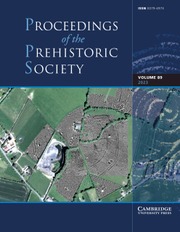Crossref Citations
This article has been cited by the following publications. This list is generated based on data provided by
Crossref.
Needham, Stuart
2000.
The Development of Embossed Goldwork in Bronze Age Europe.
The Antiquaries Journal,
Vol. 80,
Issue. 1,
p.
27.
Needham, Stuart P.
2000.
Power Pulses Across a Cultural Divide: Cosmologically Driven Acquisition Between Armorica and Wessex.
Proceedings of the Prehistoric Society,
Vol. 66,
Issue. ,
p.
151.
Jones, Andrew
2001.
Drawn from memory: The archaeology of aesthetics and the aesthetics of archaeology in Earlier Bronze Age Britain and the present.
World Archaeology,
Vol. 33,
Issue. 2,
p.
334.
Roe, Fiona
and
Woodward, Ann
2009.
Bits and Pieces: early Bronze Age stone bracers from Ireland.
Internet Archaeology,
Jones, Andy M.
Marley, Jane
Quinnell, Henrietta
Hartgroves, Steve
Evershed, Richard P
Lawson-Jones, Anna
Jones, Sue
Randall, Clare
Ratcliffe, Laura
Šoberl, Lucija
and
Taylor, Roger
2011.
On the Beach: New Discoveries at Harlyn Bay, Cornwall.
Proceedings of the Prehistoric Society,
Vol. 77,
Issue. ,
p.
89.
Frieman, Catherine
2012.
Going to pieces at the funeral: Completeness and complexity in early Bronze Age jet ‘necklace’ assemblages.
Journal of Social Archaeology,
Vol. 12,
Issue. 3,
p.
334.
Becker, Katharina
2013.
Transforming Identities – New Approaches to Bronze Age Deposition in Ireland.
Proceedings of the Prehistoric Society,
Vol. 79,
Issue. ,
p.
225.
Nicolas, Clément
2017.
Arrows of Power from Brittany to Denmark (2500–1700 BC).
Proceedings of the Prehistoric Society,
Vol. 83,
Issue. ,
p.
247.
Hermann, Raphael
2022.
Weight regulation in British and Irish Bronze Age gold objects: a reanalysis and reinterpretation.
Antiquity,
Vol. 96,
Issue. 386,
p.
336.


